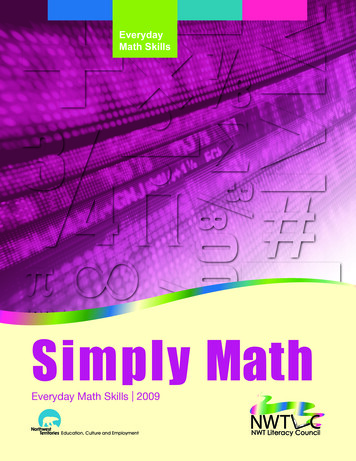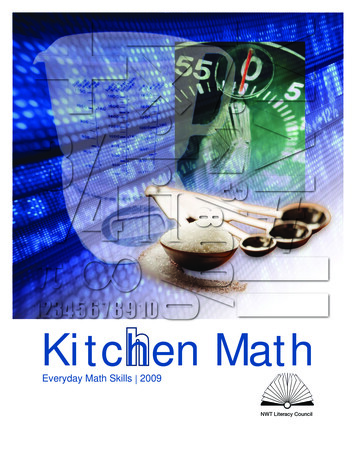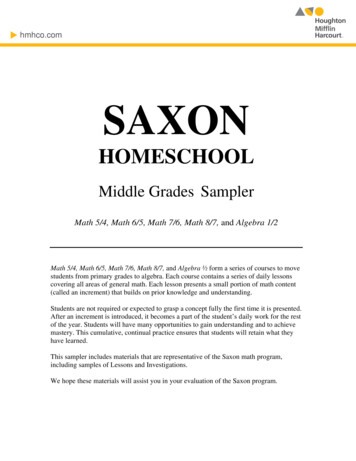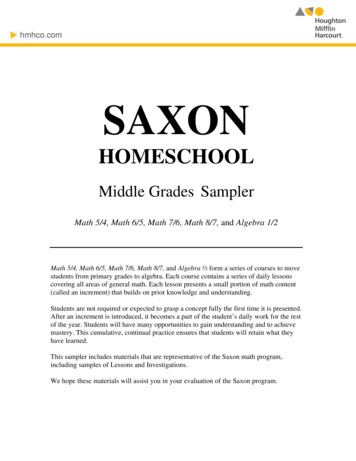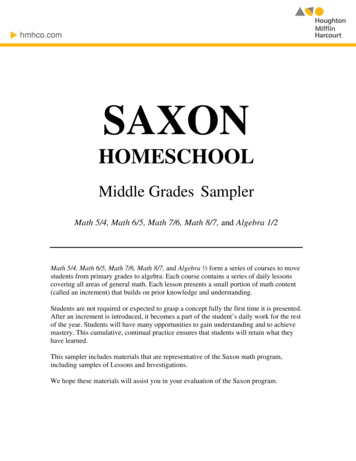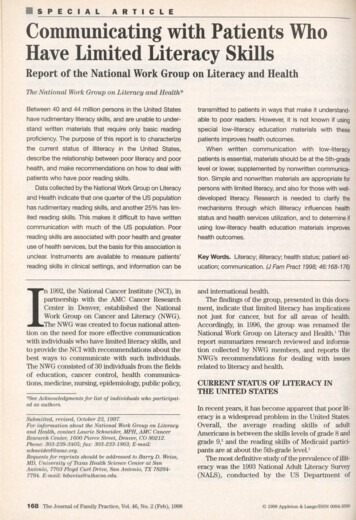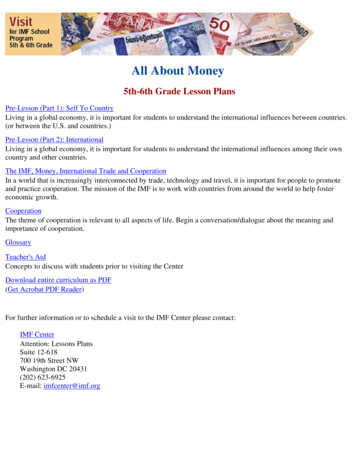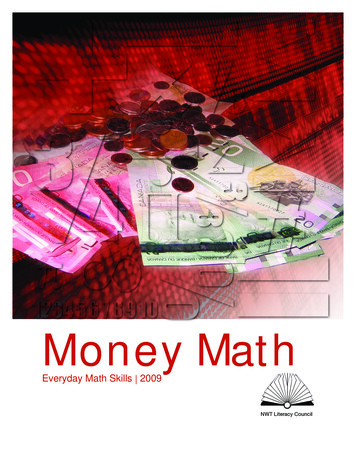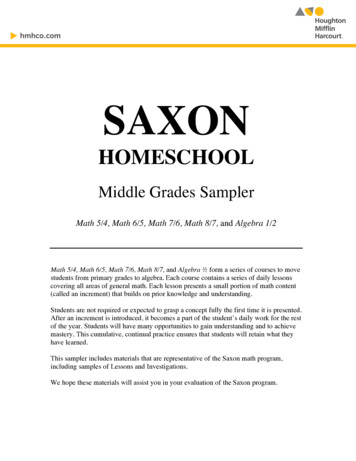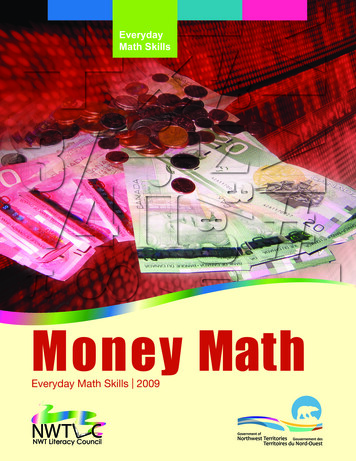
Transcription
EverydayMath SkillsMoney MathEveryday Math Skills 20091NWT Literacy Council
AcknowledgementsThe NWT Literacy Council gratefully acknowledges the financial assistance forthis project from the Department of Education, Culture and Employment,GNWT.Lisa Campbell did the research and writing for this workbook. We would like tothank Joyce Gilchrist for editing and reviewing this resource.Contact the NWT Literacy Council to get copies of the Money Math Workbook.Or you can download it from our website.NWT Literacy CouncilBox 761, Yellowknife, NT X1A 2N6Phone toll free: 1-866-599-6758Phone Yellowknife: (867) 873-9262Fax: (867) 873-2176Email: nwtliteracy@nwtliteracy.caWebsite: www.nwt.literacy.caISBN 978-1-896472-61-4 (Reprinted January 2017)Money Math Workbook
Money Math Workbook
Table of ContentsTable of ContentsTable of ContentsIntroduction. Page 3-4Personal Finances .Page 5Making a Budget. Page 6-8A Budget at a Glance. Page 9-10Your Budget at a Glance. Page 11Cutting Expenses. Page 12-13Time Card. Page 14-16Earnings Statement. Page 17-20Calculating Gross Weekly Wages. Page 21-24More on Wages. Page 25-26Paying Income Tax. Page 27-29Cashing Cheques. Page 30-31Doing Your Taxes. Page 32-33Personal Finances Review. Page 34-35Personal Finances Projects. Page 36Saving Money. Page 37Saving Money. Page 38-39Saving the Money for Retirement. Page 40-41Simple Interest on Your Savings. Page 42-45Earning Compound Interest. Page 46More on Earning Compound Interest. Page 47-49Advanced Compound Interest. Page 50-53Return on Investment. Page 54-55Saving Money Review. Page 56-58Saving Money Projects. Page 591Money Math Workbook1
Table of ContentsTable of ContentsConsumer Math. Page 61Tipping. Page 62-64Short Cut to Tipping. Page 65-66The Cost of Eating Out. Page 67Vacation Travel. Page 68-69Personal Loans. Page 70-72Discounts. Page 73-75Installment Buying. Page 76-78Cell Phones. Page 79-81Fuel Consumption. Page 82-85Finding Fuel Consumption. Page 86-88Renting a Vehicle. Page 89-91Consumer Math Review. Page 92-94Consumer Math Projects. Page 95Answer Key. Page 92-10522MoneyMath WorkbookMoney math
IntroductionIntroductionIntroductionMath is everywhere and yet we may not recognize it because it doesn't look likethe math we did in school. Math in the world around us sometimes seemsinvisible. But math is present in our world all the time – in the workplace, in ourhomes, and in our personal lives.You are using math every time you go to the bank, buy something on sale,calculate your wages, calculate GST or a tip.Money Math is one workbook of the Everyday Math Skills series. The otherworkbooks are: Kitchen Math Home MathWe have also developed a math skills booklet called Simply Math to help learnerswith different math operations that are needed for this series.Money Math has three sections. Each section has a variety of topics andworksheets and a review page. The workbook is designed so that you can workon your own or with others in your class.Section One: Personal FinancesThis section gives you an opportunity to reflect on your personal finances. Youlearn to look at your expenses and set up a budget. You consider where youmight cut expenses in your daily living. You also learn how to calculate weekly,monthly and yearly wages and how federal and NWT tax works.Money math3Money Math3 Workbook
IntroductionIntroductionSection Two: Saving MoneyIn this section you learn about simple and compound interest, saving forretirement and return on investment. When you invest money over a longperiod of time you can make a substantial amount of money. Even if you justinvest 50 a month – you can make thousands upon thousands over the longhaul. Learn how compound interest works in your favour and how you can beready for retirement.Section Three: Consumer MathIn this section you learn about spending money! How much should you tip?What does it cost to go on a vacation? How much do you really pay when youtake out a personal loan? You will also learn how to calculate discounts onmerchandise, figure out gas consumption and sort through cell phone options.The math skills are embedded into real-life situations and activities. In thisworkbook you will use the following skills: Addition and subtractionMultiplication and divisionOrder of operationsRounding offEstimationFollow formulasGraphingInterest4MoneyMath Workbook4 FractionsDecimalsPercentsMetric measurementMetric conversionsExponentsProblem solvingMoney math
Personal FinancesPersonal FinancesPersonal FinancesThis section has activities about personal finances from budgeting to calculatingthe federal and NWT tax that is taken off pay cheques. In this section you will berequired to use a variety of math skills: AdditionSubtractionMultiplicationDivisionOrder of operationsPercentGraphingProblem solvingThis section has the following worksheets: Worksheet #1:Worksheet #2:Worksheet #3:Worksheet #4:Worksheet #5:Worksheet #6:Worksheet #7:Worksheet #8:Worksheet #9:Worksheet #10:Worksheet #11:Worksheet #12:Making a BudgetA Budget at a GlanceYour Budget at a GlanceCutting ExpensesTime CardsEarnings StatementCalculating Gross Weekly WagesMore on WagesPaying Income TaxCashing ChequesDoing Your TaxesPersonal Finances ReviewThis section also has a Personal Finances Projects page.Money math5Money Math Workbook5
Personal FinancesPersonal FinancesMaking a Budget #1Addition, subtraction, multiplicationThe first step to coming up with a good budget is comparing your income to yourexpenses. Your income is the amount of money you get on a yearly basis. You mayhave several sources of income: student loans, education allowance, income support,child support, full-time job, part-time job, etc. Your expenses are everything that youspend money on from rent to coffee.Look at the example below.Source of IncomeMonthlyYearlyIncome Support 2450 29,400Part-time job 400 4800Child support 200 2400Total 3050 36,600Part 1: Figure out your monthly and yearly income. Fill in the chart below.Source of IncomeMonthlyYearlyTotal6Money6 Math WorkbookMoney math
Personal FinancesPersonal FinancesPart 2: Now it is time to calculate your monthly and yearly spending. You will havetwo types of spending: fixed and variable. Fixed expenses happen every month. Forexample, your rent would be a fixed expense. Variable expenses change each month.Try and estimate how much these are on average per month.ExpensesMonthlyYearlyHousing (mortgage or rent) (fixed)Utilities (fixed)Day care (fixed)Ongoing obligations like childsupport (fixed)TelephoneCell phoneFoodEating out (coffee, lunch, snacks etc)ClothingHome supplies (furnishings,cleaning supplies, etcTransportation (bus, taxi)Car loans and maintenanceVacationsMoney math7Money Math Workbook7
Personal FinancesPersonal FinancesRecreation (movies, videos,memberships, sports)Gifts and contributions (charity,church)Personal expenses (haircuts, petexpenses)BabysittingOtherTotal ExpensesPart 3: Does your spending balance with your income?Example:Does Mary’s spending and income balance?Problem:Mary takes in 2550 per month. She spends 2680 per month.Solution:Monthly incomeMonthly expenses 2550― 2680– 130Mary is 130 per month over her monthly budget and 1560 per year.Your Turn!Total monthly income―Total monthly expenses Total monthly balance8Money Math Workbook8Money math
Personal FinancesPersonal FinancesA Budget at a Glance #2Percent, graphing, addition, subtractionThe circle below represents a person’s monthly income ( 2500). From the total thereare the following expenses; rents costs 1250 (including utilities) food amounts to 500,transportation is 100, clothing comes to 100 and other extra expenses are another 250. rent food transportation clothing extra expenses savings1. What percentage does each item represent? Percentages are used to express howlarge one quantity is, relative to another quantity. The first one is done for you.a. Rent1250 2500 0.500.50 x 100 50%Money math9Money Math Workbook9
Personal FinancesPersonal Financesb. Foodc. Transportationd. Clothinge. Extra expenses2. How much does this person save each month? What is thepercentage?3. On the circle shade in each expenses according to their percentage. Use differentcolours to show each one. Fill the in the key at the side.10Money10 Math WorkbookMoney math
Personal FinancesPersonal FinancesYour Budget at a Glance #3Percent, graphing, additionLook at your budget and try and put all your expenses into 5-7 categories. For examplerent, food, clothing, transportation, daycare, etc. Calculate an amount for eachcategory. Then fill in the circle and the key on the side to represent your budget. 1. What percentage do you pay in rent or mortgage?2. What percentage do you pay for food?3. Are you surprised by how much you pay for certain things?4. Do you have any money left over each month?Money math11Money Math Workbook11
Personal FinancesPersonal FinancesCutting Expenses #4Multiplication, addition, subtractionIn the example on Worksheet #1, Mary spent 180 more per month and 2160 per yearthan her budget allowed. How can Mary cut her expenses?Example:Mary needs to cut her expenses.Problem:Mary spends 2.50 per day during the week on a coffee.How much would she save if she stopped getting hercoffee at the coffee shop?Solution: 2.50 x 5 days x 52 weeks 650Mary would save 650 per year.Calculate how much each person would save by cutting back on the followingexpenses.1. Michelle pays 85 per month for a fitness membership that she rarely uses.How much money can she save in one year if she quits the fitness centre?2. Lois buys about 3 packs of cigarettes per week. Cigarettes are 12.50 per pack. Howmuch money can she save in one year if she quits?3. Anne goes out to lunch every Friday. On average she spends around 18 each time. How much money can she save in one year if shestops going out for lunch each week?12Money12 Math WorkbookMoney math
Personal FinancesPersonal Finances4. Joe buys his son a Gatorade each time his son plays hockey. The Gatorade costs 2.His son usually plays 3 times a week for a half year. How much money can Joe saveif he brings water from home for his son instead of buying Gatorade?5. Jackie usually rents at least 4 movies a week. Each movie costs 5. How muchmoney would she save in one year if she decided to rent only 2 movies per week?6. Lisa likes to go to one movie per week. She usually spends 12 on herticket and 10 on a drink and popcorn. How much money would shesave in one year if she went on Tuesdays when the price of a ticket washalf off and she didn’t have any snacks?7. Ken really likes his lattes, but they are costing him a fortune. He spends 5.75 each work-day for a large latte. Ken works 5 days a week. Kenreally needs to cut back on spending so he has decided to only get asmall latte at the cost of 3.75. How much money will Ken save over thecourse of one year?8. Alice likes to have wine with her dinner on Friday and Saturday night. She usuallybuys two bottles of wine for the weekend. She really needs to cut back on spending.She decides to buy only one bottle per week. On average a bottle of wine costs 15.How much does she save in one year?9. Lori often takes a taxi instead of taking the bus. On average she takes 3 taxis a weekat a cost of 25. The bus would cost her only 6 a week. How much money wouldshe save in one week? One year?10. What can you cut back on in your life to save money? Choose one thing andcalculate how much money you can save.Money math13Money Math Workbook13
Personal FinancesPersonal FinancesTime Cards #5Multiplication, additionTime cards are filled out by employees. Maximum regular hours (before overtime) are40.1. Hannah works in a kitchen and often works split shifts. Fill in the missing amountson Hannah’s time card.Time CardEmployee: HannahDayInOutInOutMonday6:00 AM 9:00 AM11:00 AM 1:00 PMTuesday7:00 AM 10:00 AM11:00 AM 4:00 PMWednesday6:00 AM 10:00 AM12:00 PM 3:00 PMThursday9:00 AM 12:00 PM3:00 PM 7:00 PMFriday10:00 AM 3:00 PM5:00 PM 9:00 PMSaturdayOFFSundayOFF6:00 AM 1:00 PMHOURSOFFTotal HoursOFF4:00 PM 6:00 PMSALARYPER HOURRegular Hours 15.00Overtime 22.50TOTALSALARYTOTAL2. If Hannah worked these hours each week, how much would she make in:a. 2 weeks?b. 4 weeks?c. 1 year?14Money14 Math WorkbookMoney math
Personal FinancesPersonal Finances3. Hannah usually gets around 30 per day in tips from the servers from therestaurant.a. How much money does she make in tips per week?b. How much money does she make all together in one week?c. How much per hour does this work out to be? (round to the nearest cent)4. David works as a server at a restaurant and often works split shifts. Fill in themissing amounts on David’s time card.Time CardEmployee: DavidDayInOutMonday10 AM 2:00 PMTuesday10: 00 AM 2:00 PMInOutTotal Hours5:00 PM 9:00 PMWednesday6:00 AM 9:00 AM4:00 AM 8:00 PMThursday10:00 AM 2:00 PM5:00 PM 8:00 PMFriday6:00 AM 10:00 AM4:00 PM 9:00 PMSaturday6:00 AM 2:00 PM4:00 PM 7:00 PMSundayOFFOFFHoursOFFSalaryPer hourRegular Hours 10.00Overtime 15.00OFFTotalSalaryTOTAL5. If David worked these hours each week, how much would he make in:a. 2 weeks?Money math15Money Math Workbook15
Personal FinancesPersonal Financesb. 4 weeks?c. 1 year?6. David relies on tips. Breakfast is served until 10:00 am. He usually makes about 40for a breakfast shift, 60 for a lunch shift and 90 for a supper shift.a. How much does David make in tips for the week?b. How much does David make all together for one week?c. How much does that add up to per hour? (rounded to the nearest cent)7. If David worked the same hours each week (as per the time card) and made the sameamount in tips, how much would he make in:a. 2 weeks?b. 4 weeks?c. 1 year?16Money16 Math WorkbookMoney math
Personal FinancesPersonal FinancesEarnings Statement #6Addition, subtraction, multiplication, division, percentsBelow is an earnings statement for Sarah. Below is some terminology you will need toknow to answer the questions: Gross pay is the amount of money made before deductions Net pay is the amount of money made after deductions (take home pay) YTD means Year to Date Federal Tax is the tax taken off by the federal government NWT Tax is the tax taken off by the NWT government C.P.P. means Canada Pension Plan E.I. means Employment InsuranceEarnings StatementEmployee: SarahFrom: 12/1EarningsDeductionsDescription Hours RateAmountDescriptionAmount 180.00Regular80 15.00 1,200.00 Federal TaxOver time4 22.50Total 90.00 NWT Tax 1,290.00 70.80C.P.P 64.39E.I. 47.50TotalThis PeriodMoney mathTo: 12/14 362.69YTDGross Pay 1,290.00 29,670.00Net Pay 837.31 18,505.3017Money Math Workbook17
Personal FinancesPersonal FinancesPart 1: Answer the following questions using the earnings statement on the previouspage for Sarah. A normal day is 8 hours long.1. How much was put into Sarah’s Canada Pension Plan this pay period?2. How much was taken off for E.I. this pay period?3. How much were Sarah’s gross earnings during this pay period?4. How much did Sarah earn on an average day assuming that she worked a regularwork week?5. How many hours did Sarah work during this pay period?6. How much were Sarah’s deductions?7. How much did Sarah take home (after deductions) this pay period?8. How much was taken for Federal Tax this pay period?9. What are Sarah’s gross earnings this year so far?10. What are Sarah’s net earnings this year so far?11. Sarah gets time and a half for working overtime. If she works 10 hours overtime,how much gross pay would she receive?18Money18 Math WorkbookMoney math
Personal FinancesPersonal FinancesPart 2: Complete the earnings statement below and answer the questions on the nextpage. A normal day is 8 hours.Example:Lisa made 2350 for a two week period. She paid 352.50 in federal taxes.Problem:What percent was taken off in federal tax?Solution:Step 1:Divide the taxes by the amount made 352.50 2350 .15 (you will always end up with a decimal)Step 2:Multiply .15 x 100 to find the percent 15%15% was taken off for federal tax.Earnings StatementEmployee: PatriciaFrom: 07/1EarningsDescriptionTo: 07/14DeductionsHours RateAmountDescriptionAmountRegular80 22.00 1,760.00 Federal Tax 298.65Overtime7 33.00 117.47 231.00 NWT TaxC.P.P 78.23E.I. 46.59TotalTotalThis PeriodYTDGross Pay 28, 500Net Pay 19,5001. What was Patricia’s gross pay?2. What were Patricia’s deductions?Money math19Money Math Workbook19
Personal FinancesPersonal Finances3. What was Patricia’s net pay?4. How many hours did Patricia work during this pay period?5. How much gross pay has Patricia made this year?6. How much net pay has Patricia made this year?7. How much more money does Patricia make per hour in overtime?8. How much did Patricia make in overtime during this pay period?9. What percent was taken off for all deductions?(round to the nearest percent)10. What percent was taken off for federal tax? (round to the nearest percent)11. What percent was taken off for NWT tax? (round to the nearest decimal)1) 19912) 540.943) 1450.064) 87 hours5) 28,5006) 19,8007) 118) 2319) 27%10) 15%20Money20 Math Workbook11) 5.9%Money math
Personal FinancesPersonal FinancesCalculating Gross Weekly Wages #7Multiplication, division, addition and subtraction, rounding offSome people earn a salary, while others may earn a small salary plus commission onsales. People earn money in many different ways.Example 1: A traditional beader and sewer gets paid 250 per pair ofmoccasins. It takes her 20 hours to complete a pair and itcosts her 30 in materials.Problem 1: How much would she get paid if she made 5 pairs ofmoccasins per month.Solution: 250 x 5 1250 30 x 5 150 1250 - 150 1100She would make 1100 after expenses.Problem 2: How much per hour does she make?Solution:20 hours x 5 100 hours 1100 100 11 per hourShe makes 11 per hour.Problem 3: How much would she make in one year if she consistently made and sold5 pairs of moccasins per month?Solution: 1100 x 12 13,200She would make 13,200 per year.Money math21Money Math Workbook21
Personal FinancesPersonal FinancesExample 2: John earns 31,200 a year plus commission. One week hegrossed 725. He had sold 2500 worth of merchandise.Problem 1: How much does he make per week not includingcommission.Solution: 31,200 52 weeks 600He makes 600 per week.Problem 2: How much did he make in commission?Solution: 725 - 600 125He made 125 in commission.Problem 3: What is his rate of commission?Solution: 125 2500 x 100 5%His rate of commission is 5%.Directions: Calculate how much each person makes. Round your answers to thenearest cent.A. Salary1. Sally's job pays her 3,500 per month. What is her gross average weeklywage?2. Jim grosses 27,000 a year. What is his gross weekly wage?B. Hourly (A regular work week is 40 hours. Overtime pay is time and one-half).1. Sue drives a truck for 15 an hour. If she worked 40 hours, what would beher gross earnings for one week?22Money Math Workbook22Money math
Personal FinancesPersonal Finances2. Mark is a water truck driver. He makes 18 an hour. Determine hisearnings for a week if he worked 52 hours.C. Piece Work1. Gillian gets paid 17 cents a tree for tree planting in northern BritishColumbia. In one week she planted 2437 trees. What is her wage?2. A seamstress is paid 10 for every pair of pants made. How many pantswould have to be made to receive 520 a week?D. Straight Commission1. A real estate agent earns 2.4% on the sale of a house priced at 289,950.00.How much does she earn on that house?2. A salesperson sells 5780 worth of merchandise in one day. From workingon commission his gross pay for that day was 179.18. What is his rate ofcommission?E. Salary Plus Commission1. Dave earns 150 per week plus 3.8% commission. He sold 4175.68 in themonth of February. What is his gross monthly earning for February?2. Mary earns 41,600 a year not including commission. One week shegrossed 950. She had sold 5000 worth of merchandise. What is her rate ofcommission?Money math23Money Math Workbook23
Personal FinancesPersonal FinancesF. Hourly Wage Plus Commission1. Julie is a sales clerk at a bicycle shop. She is paid 12.25 per hour plus sheis given a commission of 8% of sales. In one week she worked 30 hoursand her sales were 2319.75. What is her gross weekly earnings for thatweek?2. Sam is paid 14 per hour plus 6% of sales. If he worked 37.5 hours in oneweek, what would his sales need to be for him to make 733.50 per weekbefore taxes?24Money Math Workbook24Money math
Personal FinancesPersonal FinancesMore on Wages #8Multiplication, additionCalculate gross earnings for one week given the hours worked and the hourly rate. Aregular work week is 40 hours. Overtime pays time and one half. For example if aperson was paid 10 per hour, time and one half would be 15 per hour.1.Job:Truck DriverHours Worked:40Hourly Rate: 20.752.Job:Word Processing OperatorHours Worked:35.5Hourly Rate: 16.503.Job:LabourerHours Worked:51Hourly Rate: 20.00Money math25Money Math Workbook25
Personal FinancesPersonal Finances4.Job:Auto MechanicHours Worked:60Hourly Rate: 40.005.Job:PlumberHours Worked:41Hourly Rate: 446.Job:TutorHours Worked:17Hourly Rate: 35.002626 Math WorkbookMoneyMoney math
Personal FinancesPersonal FinancesPaying Income Tax #9Percent, multiplication, subtraction, additionEveryone has taxes taken off their pay cheque. Taxes go towards things like healthcare, roads and health and social programs. In the NWT we have both federal tax andNWT tax.This is how it works for federal tax on all taxable income for the year 2008: 15% on the first 38,83222% on the next 38,832 (on the portion between 38,832 and 77,664)26% on the next 48,600 (on the portion between 77,664 and 126,264)29% over 126,264The NWT tax is much less (all based on taxable income for the year 2008): 5.9% on the first 36,885 of taxable income8.6% on the next 36,886(on the portion between 36,885 and 73,771)12.2% on the next 46,164 (on the portion between 73,771 and 119,935)14.05% on the amount over 119,936Example:Laurie makes 45,891 per year.Problem:How much is taken off in federal tax?Solution:Step 1:Calculate 15% of 38,832 38,832 x .15 5824.80Step 2: 45,891 – 38,832 7,059Step 3:Calculate 22% of 7,059 7,059 x .22 1,552.98Step 4:Add together: 5,824.80 1,552.98 7,377.78(15% .15)(22% .22)Laurie has 7,377.78 taken off in federal taxes per year.Money math27Money Math Workbook27
Personal FinancesPersonal FinancesDirections: Answer the problems below about federal and NWT tax. Round youranswers to the nearest cent.1. Susan makes 35,800 per year.a. How much does she pay in federal tax?.b. How much does she pay in NWT tax?c. How much is her annual net pay if she also pays 780 in E.I. and 2150 inC.P.P. in one year.?d. What percent of deductions is taken off her yearly salary (including E.I. andC.P.P)? Round your answer to the nearest percent.2. John makes 87,900 per year. He pays 1550 in E.I. and 3500 in C.P.P in one year.He also pays 670 in health benefits per year. Round your answers to the nearestcent.a. How much does he pay in federal tax?b. How much does he pay in NWT tax?c. How much is his annual net pay?d. What percent of deductions (all deductions including E.I., C.P.P. and healthbenefits) is taken off his yearly salary? Round your answer to the nearestpercent.3. Joan makes 123,790 per annum.a. How much does she pay in federal tax?.b. How much does she pay in NWT tax?28c. How much does she pay in taxes?Money28 Math WorkbookMoney math
Personal FinancesPersonal Financesd. What percentage does she pay in taxes? Round your answer to the nearestpercent.e. How much net pay would she receive if she gets paid every two weeks?4. Helen makes 45 per hour and she works 37.50 hours per week.a. How much money does she make per year?b. How much does she pay in federal tax?.c. How much does she pay in NWT tax?d. How much does she pay in taxes?e. What percentage does she pay in taxes? Round your answer to the nearestpercent.f. How much net pay would she receive if she gets paid every two weeks?Money math29Money Math Workbook29
Personal FinancesPersonal FinancesCashing Cheques #10Percent, multiplication, addition, subtractionSome people like to cash their cheques at the local cheque cashingplace. These places often make their money by taking off a certainamount of money per cheque. It is better to have a bank account.Banks do have some fees but they are not near the amount thatsome companies charge.One place charges a standard fee of 3.99 for each cheque and they also charge 3.99% ofthe amount of the cheque. For example: If I had a cheque for 1000, I would be charged 3.99 (standard fee) and 3.99% of the 1000. This would amount to 43.89.Example:Derek wants to cash his cheque from work at the Money Mart. His chequeis for 1100. 43Problem:How much money will he get back after Money Mart takes their cut?Solution:Step 1:Change the percent 3.99 into a decimal .0399Step 2:1100.43 x .0399 43.91 (rounded to the nearest cent)Step 3: 43.91 3.99 47.90 (add the standard fee)Step 4:1100.43 ― 47.90 1052.53. (subtract from original amount)Derek will receive 1052.53. If he does this with every pay cheque –assuming he gets paid every two weeks – he will pay 1245.40 infees in one year.30Money30 Math WorkbookMoney math
Personal FinancesPersonal FinancesDirections: Find out how much the fee is for these people when they use a chequecashing business. Use the same fees in the example on the previous page: 3.99 percheque and 3.99 % of the amount of the cheque. Round your answers to the nearestcent.1. Jodi cashes her Income Support cheque at theMoney Mart. Her cheques are for 1550 permonth. How much money does Jodi pay infees? How much does she pay over the year?2. Sam was left some money from his aunt. He hasa cheque for 5500. He goes to the Money Martto cash it. How much money does he pay infees? How much money does he take home?3. Sarah needs money fast. She has a chequeworth 2400. How much will she pay in fees?How much will she take home?a.b.a.b.a.b.4. Karen went and got her taxes done and she isgetting back 3300 in taxes. She is very excitedand wants to use the money to buy a used van.She goes to the cheque cashing business in townand cashes her cheque. How much money willshe pay in fees? How much will she take home?a.5. Owen cashes his regular pay cheques at thecheque cashing place in town. He makes 2500per month. Calculate how much does he pay infees in one year? He gets paid once a month.Money mathb.31Money Math Workbook31
Personal FinancesPersonal FinancesDoing Your Taxes #11
invisible. But math is present in our world all the time - in the workplace, in our homes, and in our personal lives. You are using math every time you go to the bank, buy something on sale, calculate your wages, calculate GST or a tip. Money Math is one workbook of the Everyday Math Skills series. The other workbooks are: Kitchen Math

